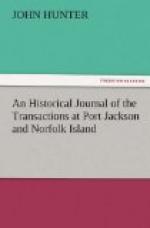On the 4th of January we had a number of good observations for the longitude, and as it was probable they might be the last we should have an opportunity of taking, before we should make Van Diemen’s Land, the result, which gave 135 deg. 30’ east, was marked with chalk in large characters on a black painted board, and shown over the stern to the convoy; at the same time a signal was made which had been previously appointed.
On the 6th in the evening, as I intended running in for the land all night, I made the signal for the convoy to close, and to drop into the Sirius’s wake, under an easy sail; the night was dark, but clear in the horizon, so that we could see near two leagues a-head. This night the aurora austreales were very bright, of a beautiful crimson colour, streaked with orange, yellow, and white, and these colours were constantly changing their places: the highest part was about 45 deg. above the horizon, and it spread from south by east to south-south-west. On the next morning at sun-rise, one of the transports having pushed a little a-head, made the signal for seeing the land, in which, however, she was mistaken: we at this time judged ourselves not less than 33 or 34 leagues from it, deducing our distance from the last lunar observation.
It may not be improper, before I proceed farther, to observe of the compass, that its westerly variation decreased from the longitude of 54 deg. 30’ east, where it was greatest, (viz. 32 deg. 10’ west,) to longitude 135 deg. 30’ east, where it was 1 deg. 00’ east.
We continued steering in for the land, and the weather being cloudy, in order to make sure of our latitude, which, in our present situation, was of consequence, we took two altitudes before noon, by which we were in 44 deg. 05’ south, which being seventeen miles to the southward of the rock, called the Mewstone, we hauled from east-north-east to north-east, and at three P.M. of the 8th, (by log,) we made the land in that direction, stood well in with the Mewstone, and, as the wind was fresh from the westward, I would have gone within it, and ranged along the coast from point to point; but having a convoy of transports and store-ships astern, who were to be led by the Sirius, I was apprehensive, in case it fell little wind under the land, and night set in, an accident might have happened to some of those ships, which all the knowledge I could have gained, by a nearer examination of the coast, would not have compensated: I therefore stood on without the Mewstone, and steered in for the south cape, which we passed at three miles distance, leaving the rocks Swilly and Eddistone without us. The south cape terminates in a low rocky point, and appears to be a bold shore, and the hills within it, which are moderately high, appear to have many tall trees upon them, which are very streight, and seem to have no branches, except near the top; from which circumstance, I suppose them to be the palm or cabbage tree.




